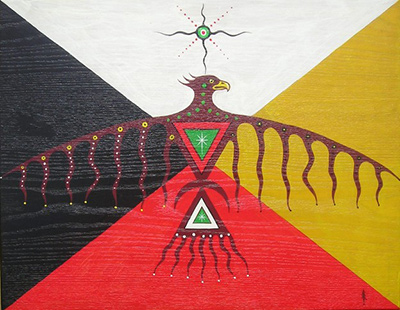
Tim Yearington, the Algonquin-Métis Knowledge Keeper within the Office of Indigenous Initiatives, writes about the importance of honouring Indigenous knowledge as the key to starting our learning journey.
Lately I find myself pondering, or rather re-imagining, this: A long time ago my Algonquin ancestors saw the future. They did so by honouring and acting upon the knowledge that came to them – directly from the Creator – in what we call “the dreamtime.” One of the interesting things they re-imagined, or rather what they “saw”, was a clear vision of our current time.
To help us face the challenges of today, long ago my ancestors chose to share their vision. They called it the Time of the Seventh Fire. Their vision revealed that during the time of the Seventh Fire a “New People” will emerge. The New People will be looking to find what our ancestors left behind upon the trail. Aware of the dilemmas of the day, the New People will suddenly wake up and realize they need to find those lost things – very valuable teachings – that were left upon the trail. When the New People finally find those important things, they will need to pick them up. But not just hold these teachings blindly and think about it all as knowledge. Nope, the real reason they are to pick them up is because it’s time to learn how to embrace and use them.
When I think of re-imagining the institution of Queen’s, what I see is that we, ourselves, are the New People. We are slowly waking up to the awareness that, first of all, there is actually a trail; the trail to traditional Indigenous knowledge. Now that we know we’re on this trail, it’s wise to admit we’re lost and often don’t know which way to turn. We’ve reached a fork in the trail yet our own ignorance and fear prevents us from understanding the best way to proceed forward.
How do we make the best choice? How can we proceed up the trail in a respectful way?
The elders from all Nations here upon Turtle Island (North America) – those who still carry the traditional Indigenous knowledge of our ancestors – are given the responsibility of sharing it. Today’s elders are present to encourage the others, the New People, to find the teachings, pick them up and then utilize this wisdom in a good-hearted way. The reason this is now necessary is because we are living in critical times. Could it be that Queen’s is finally starting to re-imagine the truth of the matter that Indigenous knowledge not only still exists, but that it actually holds the key to helping all of us walk up the trail on our learning journey together? This is what I see. This is what I am re-imagining for Queen’s University.
When I was young I was taught, “We go to school in our dreams.” This is because it is believed that this is where the manitous (spirits) come and talk to us and teach us about the knowledge our ancestors have carried since time immemorial to help us be well and have a good life.
So, inspired by the wisdom of my ancestors – wisdom, by the way, that has served us since the time of the last Ice Age – I always feel guided to learn more about our traditional Algonquin knowledge. Additionally, I feel the time is right to embrace it and utilize it in a good way. But more importantly I can admit, from the things I’ve seen during my own journeys into the dreamtime, that what’s most important to our current reality is that we act upon the knowledge and wisdom we have access to in order to consciously create change.
Change is hard. But in this age I believe change is what matters most.
As the creators of our own trails and life paths, I see today we must make a decision at the fork in the trail: We can tokenize Indigenous territory, traditional knowledge and worldview – and even check the box to show we’ve completed the task – but this will only steer us deeper into the darkness of our ignorance. Alternatively, in a respectful way, we can make a real conscious effort to learn more about traditional Indigenous knowledge because, ultimately, it’s today’s Time of the Seventh Fire that will help us change the way we see, grow, believe and think.
My dream is this: I imagine that we, the New People, are now smart enough to realize and accept that Indigenous knowledge holds good medicine to help us learn to be better human beings. And as academic learners, we’d best be wise to recognize our own ignorance first. Because without first acknowledging there is still a cold climate of ignorance, we cannot confidently explore the trail as we seek the true human value of Indigenous knowledge.
Once we do have more awareness about the nature of our life-long learning journey, we will have a critical choice to make: We can either ignore our awareness or we can act upon it.
Tim Yearington